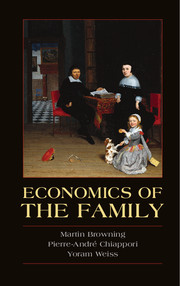Introduction
Published online by Cambridge University Press: 05 July 2014
Summary
The existence of a nuclear family is to a large extent dictated by nature. According to Aristotle (Politics, Book 1 part 2), “there must be a union of those who cannot exist without each other; namely, of male and female, that the race may continue (and this is a union which is formed, not of deliberate purpose, but because, in common with other animals and with plants, mankind have a natural desire to leave behind them an image of themselves).” However, families are also economic units that share consumption, coordinate work activities, accumulate wealth, and invest in children. Indeed, Aristotle adds, “The family is the association established by nature for the supply of men's everyday wants”
Economists' interest in the family dates back to Cantillon (1730), Smith (1776), and Malthus (1798). These authors investigated the connections between economic circumstances and the size of the population. In particular, they discussed the subsistence wage and family size that can support a stable workforce over time, including current workers and their descendants who will replace them. The main economic decision discussed in this context was the timing of marriage as a means to control fertility. Later writers, including Mill (1848) and Le Play (1855), have shifted attention to the impact of the family on the standard of living of its members, via self-production, insurance, and redistribution of family resources.
- Type
- Chapter
- Information
- Economics of the Family , pp. 1 - 8Publisher: Cambridge University PressPrint publication year: 2014
- 9
- Cited by



